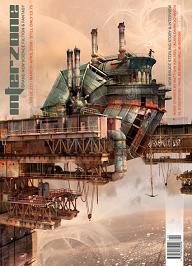 “A Clown Escapes From Circus Town” by Will McIntosh
“A Clown Escapes From Circus Town” by Will McIntosh
“Fishermen” by Al Robertson
“Saving Diego” by Matthew Kressel
“Far & Deep” by Alaya Dawn Johnson
“Home Again” by Paul M. Berger
“Black Swan” by Bruce Sterling
Reviewed by Bill Ward
The issue opens with a story from Interzone regular Will McIntosh, “A Clown Escapes From Circus Town,” which gives us a weird future in which the denizens of various theme-park style towns (Medieval Village, Superhero Cove, Sextown) live lives based entirely around the central theme of their city. Beaners, a clown kept in slave-like conditions in Circus Town, escapes into the larger world, teams up with a Green Arrow Superhero in search for his lost love, and returns to liberate his comrades from the mysterious Management of Circus Town. At turns grim and farcical, the story moves briskly from scene to scene toward what has clearly always been its ultimate goal of explaining just why Beaners’ world is the way it is.
“Fishermen” by Al Robertson is an historical piece with no speculative elements, but with a real sense of the extraordinary just the same. Set in the Early Renaissance, it concerns an artist captured by Adriatic pirates and taken to the small fishing village of Omis, the pirates’ base of operations. There he learns to approach his art differently, to reject old models and see the divine in the living, and to paint the interior of the village church so that it might be a true reflection of the community it serves. A quiet, confident tale told with real skill and sensitivity.
Matthew Kressel‘s “Saving Diego” concerns protagonist Mikal’s attempt to get his friend Diego off a strange hallucinogenic drug, jisthmus, on a planet far from Earth. But the ‘higher consciousness’ obtainable by the drug intersects a realm of thought frequented by the numens — beings of godlike power capable of destroying whole planets. But as Diego makes progress in kicking his habit, Mikal succumbs to the lure of the drug. Told with cyberpunkish verve, “Saving Diego” takes full advantage of its intergalactic setting to interlay themes of the vast and the unknowable alongside human-scaled concerns of addiction, friendship, and betrayal.
The murder of the protagonist’s mother sets up the action in Alaya Dawn Johnson‘s “Far & Deep.” When the Elders in charge of her insular island community refuse to grant her mother a proper funeral — or seek justice for her murder, Leilani decides to take matters into her own hands. Going against her Elders’ wishes, asking questions to those that knew her unconventional mother, Leilani discovers not only her mother’s killer, but comes to better know her mother herself.
Paul M. Berger‘s clever short-short “Home Again” is told from the perspective of Julia, whose father is a thought-ship pilot just coming home for a visit. But reality is mutable in Julia’s world, and her identity undermined by the author’s subtle clue leaving. A quick, smart story that asks the reader to read between the lines, and is just too nice to spoil by giving any more details.
Bruce Sterling (who is also interviewed in this issue) is the biggest name here, and his “Black Swan” is a day-after-tomorrow near future tale of a journalist-blogger meeting with a very unusual hacker — one that can move between parallel worlds. Various versions of Italy, the story’s setting, and of the larger world itself branching in different directions from events of the 1980s are plausibly constructed, and musings on how small differences in events or unforeseen bursts of genius can radically change the planet take center stage. A fascinating look at history and how we understand our own reality.
Interzone 221 is another good, solid issue with a great variety of story styles and flavors. Add in Interzone‘s considerable columns, news, and reviews sections and you’ve got a periodical that should appeal to any fan of genre storytelling, speculation, and idea driven fiction.